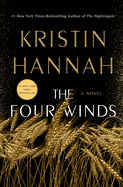
From "unmarriageable" to fierce migrant mother, Elsa Martinelli defies the tragedy of the Great Depression as Kristin Hannah (The Nightingale; The Great Alone), once again compassionately portrays a resilient woman, in her 24th novel, The Four Winds.
In the Texas Panhandle of 1921, 25-year-old Elsa Wolcott was deemed a spinster, shunned even by her privileged family. When Rafe Martinelli "dishonors" Elsa, her father literally drops her on the Martinelli farm. Elsa earns her new family's acceptance, giving birth to their granddaughter Loreda, and then a boy, Ant. But after years of crop failures, the Dust Bowl erodes both the farm and the family.
Again abandoned when Rafe leaves them, Elsa remains devoted to her in-laws and the land that now chokes them with dark clouds of dirt. In 1935, Ant nearly dies of "dust pneumonia," and so, with adolescent Loreda's prodding, she reluctantly sets off for "that land-of-milk-and-honey nonsense": California. Hannah inserts Loreda's voice, alternating the young woman's feisty perspective with the third-person narrative, emphasizing the era's multi-generational suffering. In California, they are ridiculed as "Okies," starved in squalid camps and exploited as field workers. Thirteen-year-old Loreda, ever defiant, grows receptive to Workers Alliance labor organizers. Her attraction to the "Reds" brings a climax to the plot both historic and personal. Elsa cites "loss and poverty and man's mistakes" for the economic and climate disasters, but it is Loreda who expresses a satisfying epitaph to the family's saga, describing Elsa: "She taught me to stand up and find my woman's voice, even in this man's world." --Cheryl McKeon, Book House of Stuyvesant Plaza, Albany, N.Y.

